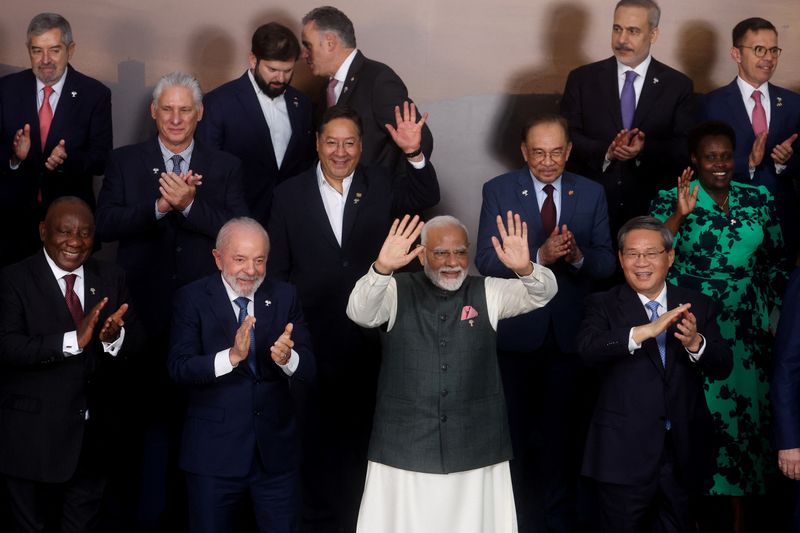BRICS tariff to be applied only if they adopt policies deemed ‘anti-American’, source says

By Andrea Shalal
WASHINGTON (Reuters) -The Trump administration will not immediately impose a new 10% tariff against members of the developing nation BRICS bloc, but will proceed if countries take so-called “anti-American” policy actions, according to a source familiar with the matter.
President Donald Trump said on Sunday that the United States will impose an additional 10% tariff on any countries aligning themselves with so-called “anti-American policies” of the BRICS group of developing nations, triggering sharp denials from its members that they were oriented against the United States.
“A line is being drawn. If policy decisions are made that are anti-American, then the tariff will be charged,” said the source, who requested anonymity because they are not authorized to speak on the matter.
No executive order has been released by the White House.
Trump’s announcement, made on his Truth Social media platform, came as India, Indonesia and other countries within the BRICS group were negotiating last-minute trade deals with the U.S. government ahead of a July 9 deadline when tariff rates had been scheduled to go up. The effective date for those tariffs has now been postponed until August 1.
Trade experts said the new tariff threat was aimed at maintaining and increasing pressure on countries seeking to avoid high tariffs proposed by Trump in April. Many BRICS members and partner countries are highly dependent on trade with the United States.
Trump’s posting came hours after BRICS leaders issued a 31-page statement in which they condemned attacks on Gaza and Iran, called for reforms to global institutions and warned that unilateral tariffs threatened global trade.
The first BRICS summit in 2009 was attended by leaders from Brazil, China, India and Russia, with South Africa joining later. Egypt, Ethiopia, Indonesia, Iran and the United Arab Emirates were included last year, and Saudi Arabia, while accepted as a member, is participating as a partner country.
Other partner countries include Bolivia, Nigeria, Cuba, Kazakhstan, Malaysia, Thailand, Vietnam and Uganda.
Trump has close ties to leaders of some of those countries, such as Saudi Arabia and UAE, and has been touting the prospect of a trade deal with India for weeks. His administration concluded a framework trade deal with Vietnam last week, and has been in talks about a similar agreement with Thailand.
In the BRICS leaders Sunday statement, they condemned attacks on Gaza and Iran by Israel, a U.S. ally, and called for reforms to global institutions, warning that the rise in “unilateral tariff and non-tariff measures” threatened global trade.
It was not immediately clear if Trump’s latest tariff threat would derail trade talks underway with India, Indonesia and other BRICS nations.
South Africa insisted it was not “anti-American” and said its talks with the U.S. government remained constructive.
Indonesia, keen to avert a threatened 32% tariff rate, is due to sign a $34 billion pact with U.S. partners this week and has offered to cut duties on key imports from the United States to “near zero” and to buy $500 million worth of U.S. wheat.
(Reporting by Andrea Shalal;)









